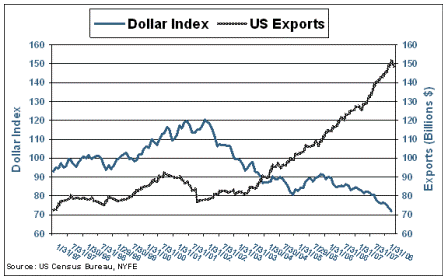The desire to accumulate $US financial assets has been diminished for at least the following reasons:
- Treasury policy – Paulson is actively pushing both a strong yuan and threatening any other CB that buys $US with the label of ‘currency manipulator.’ CB’s had been perhaps the largest source of $US financial assets accumulation and are now limited to compounding of interest.
- US foreign policy is probably driving CB’s in less than friendly nations to diversify their reserves away from $US financial assets.
- Fed policy has the appearance of a ‘beggar thy neighbor’/’inflate your way out of debt’ policy, as the Fed aggressively cuts rates in the face of inflation not seen in 25 years.
This all sets in motion a downward pricing of the $US as non residents sell them to each other at lower and lower prices in this effort to lower their rate of accumulation of $US financial assets. But these financial assets can only ‘go away’ when they get spent or invested in the US, when US prices are low enough to cause this to happen. The rapid rise in exports and accelerated non resident buying of US real estate and other assets is anecdotal evidence this is taking place as theory predicts.
This is a very large cyclical force that should continue to drive rapidly rising exports for perhaps a year or more. Weak foreign economies should have little effect on this process, as that weakness doesn’t reduce the desire of portfolio managers to shift out of $US financial assets.
This is also highly inflationary for the US. This buying by non residents both drives down the $US and drives up the prices of US exports, now rising at a 7% clip last I checked.
The desired shift is probably well over $1 trillion which means exports will increase by a good part of that to facilitate this transfer.
This can sustain US GDP in the face of falling domestic demand, which will stay relatively low until housing picks up. Employment will remain reasonably good, but standards of living fall as we produce as much, but export more and consume less. We get paid to work but can buy less due to high prices, with our remaining production exported to those wishing to reduce their accumulated $US financial assets.
We’ve been talking about this possibility about a long time, but seems our trade negotiators have finally got their wish.
Meanwhile, Saudis continue to act the swing producer. In fact, they told Bush today they have 2 million bpd capacity in reserve, and that markets are well supplied. At their price, of course.
Probably have been some year end allocations out of crude by pension funds as with the price hikes they would need to sell some to keep the same ‘weight’ in their portfolios. That should be ending soon.
And I agree with Karim, the Fed is not likely to act on inflation until core starts to rise or their measures of inflation expectations start to rise, despite the fact that mainstream theory clearly says if any of that happens it’s too late. Seems to me the senior FOMC members are putting their jobs on the line by taking that kind of systemic risk, which their own theory tells them is far higher than the risk of any lost output from a .
♥

